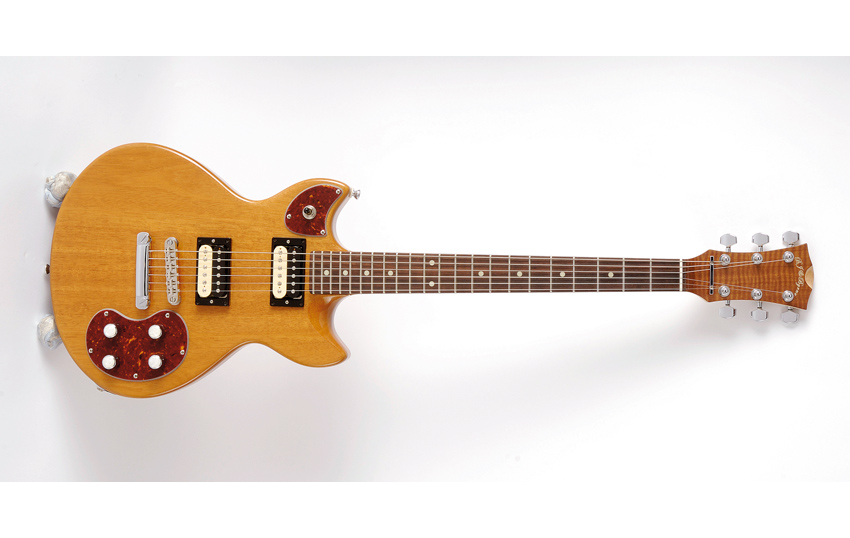MusicRadar Verdict
A tough sounding riff monster with some classic rock tones, the Roundhouse needs gigging!
Pros
- +
Bigger acoustic ring; classic rock humbucker sounds.
Cons
- -
It's a little heavy and unbalanced on a strap.
MusicRadar's got your back
With its SG-meets-Gordon-Smith outline, the Roundhouse presents a different but stylistically similar design.
Made from two pieces of immaculately jointed and diagonally grain-matched South American mahogany, it's a little weightier and slightly less balanced on the strap.
The cream 'plates are replaced with faux tortoiseshell and reduced in size - the four controls are laid out more squarely and slightly closer to the bridge and control two open, zebra-coiled Bare Knuckle Black Dog humbuckers.
"With the mahogany body, a heavier guitar, we thought we'd go for pickups that'll break up a little quicker - it's more of a rockier guitar," explains Brian Troupe of BJ & Byrne guitars. And even before we plug in, we'd agree.
The neck, again an oil-finished maple bolt-on, is one-piece and the head - very unusually - isn't back-angled but is Fender-like flat, necessitating a Floyd Roselike string retainer placed behind the nicely cut nut.
It looks a little naff but from the first acoustic strum you can't fail to be impressed: there's more bulk to the sound, bags of ringing sustain and the neck feels slightly bigger in the hand. And this one even has a little flash: note the flamed maple faced headstock that's coloured to match the body. Careful chaps…
Sounds
Certainly the bridge pickup will scalp your front row if you let it, but it's quite low in output so avoids sounding too shrill and hard.
The neck pickup adds the contrast with a much smoother, soupier tone with plenty of definition, while the dual pickup mix is really sweet, creating plenty of classic oldschool clean tones.
In fact just pulling down the pickup volume knocks off the highs, and as we settle in we begin to hear plenty of scope: classic pop and soul, country and Americana, not in a hot-rod sense but with more chime than grime.
It can sound nasty, but not like a Tele's back pickup; it's a little more polite and with some lighter gains and both pickups on we found, perhaps, the guitar's sweet spot: jangle, some twang and a little guts all thrown into the stew. Nice.
The Roadhouse is a little bit of a shock with a bigger acoustic voice that, plugged in after the Apollo,
nicely fries our amp.
Yet even though it's a bigger voice there's still that bolt-on edgy-ness, clarity and bite that's more humbucking Tele than SG. Again the pickups impress with the kaleidoscope of classic sounds from just a few volume/tone changes.
The neck pickup handles blues and jazz with a cleaner amp tone, turn up the wick and it's more seventies bump 'n' grind. Even at higher gains it doesn't mush out too much and retains definition without ever sounding over 'clean'.
The neck does feel slightly bigger, there's a little pull on the strap, but there's a lot of juicy tone in here centred around a currently very contemporary rock classicism - yes, think Led Zep's riffery - it just needs a classic British amp as a partner.
Dave Burrluck is one of the world’s most experienced guitar journalists, who started writing back in the '80s for International Musician and Recording World, co-founded The Guitar Magazine and has been the Gear Reviews Editor of Guitarist magazine for the past two decades. Along the way, Dave has been the sole author of The PRS Guitar Book and The Player's Guide to Guitar Maintenance as well as contributing to numerous other books on the electric guitar. Dave is an active gigging and recording musician and still finds time to make, repair and mod guitars, not least for Guitarist’s The Mod Squad.
"There’s plenty for us guitarists to learn – and ‘less is more’ is the overriding lesson": how to play like George Harrison on The Beatles' Abbey Road
“They didn’t like Prince’s bikini underwear”: Prince’s support sets for the The Rolling Stones in 1981 are remembered as disastrous, but guitarist Dez Dickerson says that the the crowd reaction wasn’t as bad as people think
“We are so unencumbered and unbothered by these externally imposed rules or other people’s ideas for what music should be”: Blood Incantation on the making of Absolute Elsewhere and how “Data from Star Trek” saved the album – and the studio











